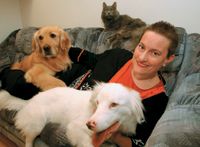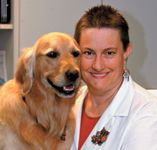An Interview with... Dr. Robin Downing
"Our ability to recognize and respond to animal pain is in its infancy," says this practitioner, author, and president of the International Veterinary Academy of Pain Management. "There are still animals that suffer needlessly because of our deficiencies."
Robin Downing, DVM, is the hospital director and co-owner of the Windsor Veterinary Clinic in Windsor, Colo., an affiliate faculty member at Colorado State University, the president of the International Veterinary Academy of Pain Management, and a Veterinary Medicine Practitioner Advisory Board member.
What is the most exciting change you've seen in veterinary medicine?
In my 20-year career I have witnessed firsthand the migration of pets from the backyard to the bedroom and from the kennel to the couch. (Thanks, Dr. Marty Becker.) This has transformed the practice of veterinary medicine in terms of how we serve our patients and clients.

Dr. Downing with her 5-year-old cat Pearl, who was born with a twisted spine, resulting in paralyzed hindlimbs; 4-year-old Golden retriever Farrah (a.k.a. Farrah Leaky Faucet), who was born with ectopic ureters that have now been repaired; and 3-year-old Australian shepherd mix Opus, who is genetically deaf.
Who inspired you most in your career?
Sharon, my partner of 28 years who believed in me even when I didn't; Dr. Greg Ogilvie, my mentor during veterinary school and beyond; Dr. Virgil Humphreys, who kept learning until his death; Dr. Marty Becker, who lives The Bond like no other; Dr. Peter Hellyer, a passionate pain management advocate; and Dr. Mary Beth Leininger, the first female AVMA president.
What would you advise a new graduate?
Commit to being an advocate for beings that cannot advocate for themselves. Keep an open mind. Remain a lifelong learner. Find balance in life. Never give away your integrity. Network, network, network—you never know how someone may help you. Have more fun than adults should have!
Who was your most memorable patient?
Murphy, my own black-and-white Great Dane. She survived 4 ½ years with osteosarcoma (twice) and served as the mascot for the Animal Cancer Center at Colorado State University. She inspired my book Pets Living With Cancer: A Pet Owner's Resource, met retired Gen. Norman Schwarzkopf, and taught me about grace under pressure.
What would you have liked to do if you hadn't become a veterinarian?
My first degree was in English, so I would be teaching English literature at a university somewhere. An English degree and a DVM degree are similar in that you can do anything and go anywhere with them.

Dr. Downing has received many awards, including the 2001 World Small Animal Veterinary Association's Excellence in Veterinary Healthcare Award and a Hill's Animal Welfare and Humane Ethics Award.
Are you a cat person or a dog person?
I'm a bit of both. We've shared our home with as many as 14 cats and five dogs at one time. Each of our animals has a disability. It sometimes feels as though we run an assisted-living facility!
Do you have a bad habit?
I love what I do, so my vocation and avocation are one in the same. That means I don't always play enough. I'm working on that!
What book would you recommend?
Two books I consider essential reading are The 7 Habits of Highly Effective People and The 8th Habit: From Effectiveness to Greatness, both by Stephen R. Covey. The seven habits help you find your own voice. The eighth habit helps you guide others to find their voices—the core of servant leadership.
What books are you reading now?
The Pleasure of Finding Things Out: The Best Short Works of Richard P. Feynman; My Job, My Self: Work and the Creation of the Modern Individual by philosopher Al Gini; and I'll Be Seeing You by suspense author Mary Higgins Clark.
What is your favorite film?
To Dance with the White Dog with Hume Cronyn and Jessica Tandy. An elderly widower is bereft until a white dog materializes as his new companion and confidant. This touching story is the embodiment of the remarkable healing power of pets and a reminder of the relationship we serve.
What part of your work do you enjoy most?
I love facilitating, enhancing, lengthening, and strengthening the precious family-pet relationship. In addition, I live for opportunities to help others to achieve their personal and professional best, whether it is helping my own hospital team, veterinary students and veterinary technician students, or veterinary healthcare teams at conferences and other training venues.
What do you consider the greatest threat to the profession?
Complacency. Period.
Which animal health needs are currently unmet?
Our ability to recognize and respond to animal pain is in its infancy. That means there are still animals that suffer needlessly because of our deficiencies. In addition, needless euthanasia of healthy animals simply because there is no room for them remains an embarrassing blight on the veterinary profession.
What changes in veterinary medicine do you hope will occur in the next 100 years?
With the mapping of the canine genome, I hope to see a cure for canine cancer and other genetically driven diseases. I also hope the feline genome will be mapped for the same reasons. Finally, I hope to see new and better ways to manage animal pain.
What is your sci-fi prediction for veterinary medicine?
I grew up watching Star Trek, so I dream of the day we can use a veterinary tricorder to noninvasively and comprehensively evaluate our patients.
What are the greatest achievements of your career?
- Helping to found the International Veterinary Academy of Pain Management and serving as its president.
- Writing Pets Living With Cancer: A Pet Owner's Resource, still the only volume of its kind for pet owners.
- Receiving the 2001 World Small Animal Veterinary Association's Excellence in Veterinary Healthcare Award.
What makes a good veterinarian?
Good veterinarians are committed advocates on behalf of beings that cannot advocate for themselves. They are shameless in their enthusiasm for the family-pet relationship, and they are unwilling to sacrifice competence on the altar of ego. They learn forever, are tightly attached to their integrity, and understand the critical nature of communication.